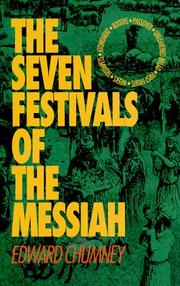Check nearby libraries
Buy this book

One of the most fascinating, yet probably one of the least understood, topics in the Bible is that of the feasts listed in Leviticus. In a step-by-step examination of each festival, you will learn foundational truths and the prophetic connections to Jesus' first and second comings. This book will give tremendous insight into your personal relationship with God!
Check nearby libraries
Buy this book

Previews available in: English
Showing 1 featured edition. View all 1 editions?
| Edition | Availability |
|---|---|
|
1
The seven festivals of the Messiah
1994, Treasure House
Softcover
in English
1560437677 9781560437673
|
aaaa
Libraries near you:
WorldCat
|
Book Details
First Sentence
"Chapter 1 The Appointed Feasts Understanding the Feasts The festivals of the L-rd found in Leviticus (Vayikra) 23 were given to us by G-d so His People could understand the coming of the Messiah (Mashiach) and the role that the Messiah (Mashiach) would play in redeeming and restoring both man and the earth back to G-d following the fall of man in the Garden of Eden (Gan Eden). Although most non-Jewish Bible believers have heard of the feasts, the deep meaning and the importance of these feasts are almost universally not understood. The apostle Paul (Ray Sha 'ul) wrote to the Gentile believers in Colossae that the feasts of the L-rd, the new moon, and the Sabbath (shabbat) days were a shadow of things to come to teach us about the Messiah (Mashiach) (Colossians 2:16-17). Yeshua (the Hebrew name for Jesus, which means “salvation”) was the substance or fulfillment of the greater plan that G-d revealed and foreshadowed in these seven important festivals. To all the readers who are unfamiliar with the festivals, you will be fascinated to discover that the first four feasts or festivals, which are Passover (Pesach), Unleavened Bread (Hag HaMatzah), First Fruits (Bikkurim), and Pentecost (Shavuot), primarily teach about the significant events in the first coming of the Messiah (Mashiach) and why these events were an important part of G-d's redemption of man. In addition, you will discover that the last three feasts, which are the Feast of Trumpets (Yom Teruah; also known as Rosh HaShanah), the Day of Atonement (Yom Kippur), and the Feast of Booths or Tabernacles (Sukkot), give fascinating insight concemning important events that surround the second coming of the Messiah (Mashiach). Why Study the Feasts? Many non-Jewish Bible believers wonder why they should study and observe the feasts. I believe there are two good reasons. First, although all Bible believers love G-d with all their heart and scek to serve Him daily, most Bible believers do not have an in-depth understanding of the Bible and do not understand the deep depth of the personal relationship that G-d desires us to have with Him. Most Bible believers understand their Personal relationship with G-d the same way I viewcd my personal relationship with G-d for many, many years: Attend the local congregation of your choice faithfully and regularly, and be a good, moral, honest, and decent person in living your daily life. Because that was all I knew, that was what I accepted. However, G-d began to teach me and show me the deeper things concerming my personal relationship with Him. and a spiritual understanding of the festivals was a big key to unlocking this mystery. If you are a Bible believer and you desire to understand G-d in a greater way than you do today, the festivals will reveal to you..."
Table of Contents
Edition Notes
Includes bibliographical references (p. [219]-221).
Classifications
The Physical Object
ID Numbers
Work Description
It is about the Lord's festivals he ordained in the book of Leviticus 23rd chapter. bible students will learn that the festivals are/were not only historic but prophetic as well. The festivals pointed to the coming Messiah and also to his second coming. Also the festivals give us insight into living the life that God desires for us as believers, and understanding our personal relationship with God.
Community Reviews (0)
Feedback?History
- Created April 1, 2008
- 12 revisions
Wikipedia citation
×CloseCopy and paste this code into your Wikipedia page. Need help?
| September 17, 2022 | Edited by ImportBot | import existing book |
| July 27, 2021 | Edited by ISBNbot2 | normalize ISBN |
| November 20, 2020 | Edited by MARC Bot | import existing book |
| October 10, 2011 | Edited by ImportBot | import new book |
| April 1, 2008 | Created by an anonymous user | Imported from Scriblio MARC record |














